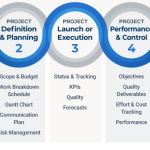After spending several years managing project managers for various technology organizations, I always get amazed to find out that many project managers struggle on how to get a project started. They are assigned a new project, and for many weeks and sometimes months they don’t know what to do to move their project forward, and little or nothing gets done during that time. Could it be that the project manager doesn’t fully understand the assignment, is not comfortable with their business knowledge on the subject, or maybe with the technology to be used? Neither one of these excuses are valid or relevant, but in either case, the project managers feel overwhelmed with the complexity and lack of definition of the task at hand. They don’t know how to take the first step and they end up wasting valuable time that is usually precious towards the end of the project. I fully understand that having too many unknowns at the beginning of the project can be overwhelming, but if you are prepared with a well defined approach on how to start your project you will be able to quickly put your project in motion and get off to a good start.
So how do you get a project started? Very simple, organize a project kick-off meeting as soon as possible to help you collect the basic project information. Invite a group of stakeholders’ representatives including management, business experts and members of the development team. The main objective of this meeting is to define the project and do some initial high-level planning. A successful agenda for this type of meeting should include the following discussion points:
● Meeting Objectives: What do we want to achieve at the end of this meeting.
● Project Objectives: What do we want to achieve at the end of this project.
● Project Approach: Define the main phases or components of the project, what is expected during the project, are we following a specific methodology?
● Deliverables: Discuss and document what are the expected deliverables of the project so that there are no misunderstandings on what will be produced.
● Project Team: You might want to create and organization chart of your project, including main stakeholders, steering committee members, subject matter experts and technical resources that will be participating in the project.
● Roles & Responsibilities: It is also a good idea to define the main responsibilities of each role in the project team. This will help to set expectations from the very beginning.
● Change Control: Define the process that will be used to manage change, especially scope change.
● Communication Plan: Define how the project communication will be done: Status Reports, frequency of meetings, project portal, etc.
● Risks: Identify the main potential project risks. This should be handled as a mini risk assessment session.
● High-level Requirements: This is a very important part of the meeting, since you can collect a high-level description of each requirement, usually in a few lines per requirement. It is important to identify each requirement with an identification number or ID, and if possible with a priority indicator, like high, medium, low. I have successfully used a PowerPoint table to capture requirements during the meeting so that everybody can see them when projected on a large screen.
● Timeline: Discuss a tentative timeline for the project, but be sure to let everybody know that the timeline will need to be validated once the detailed project schedule is completed.
A meeting like this could take anywhere from a few hours to two full days depending on the size of the project. Notice that by the end of this meeting, you would have met your main objective of clearly defining the project, and you would have collected enough information to complete your “Project Charter” documentation. After that you can move into your detailed requirements phase or your first “sprint” cycle in case you are using an agile methodology.
Author: Mr. Carlos Urrutia is an experienced project and program manager with over 20 years of professional career. He has worked for technology consulting organizations as well as private corporations. Former managing director of Encore Development, a project based consulting firm, Mr. Urrutia has been exposed to a wide variety of projects, domestically and internationally. He currently directs a departmental PMO and manages a multimillion dollar project portfolio for a large financial services organization. His experience managing and mentoring project managers has provided him with invaluable insight into the challenges faced by project managers on a daily basis. Mr. Urrutia holds a degree in Mechanical and Electrical Engineering, a Masters in Computer Science and is PMP certified.


